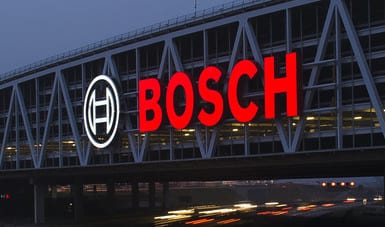German company Bosch has consolidated its activities centered on the Internet of Things (IoT) into a new subsidiary.
With some 900 associates, Bosch.IO covers a wide range of IoT services including consulting, implementation and operation.
“With Bosch.IO, we are strengthening our position as a leading IoT company,” said Bosch Board of Management member Michael Bolle. “With Bosch.IO’s new setup, we are combining the I and T in IoT to bring the internet of things to everything from roads and factory floors to homes and fields,” said Bolle.
The German company said that the core element of the Bosch subsidiary’s product portfolio is the Bosch IoT Suite.
The Bosch IoT Suite already connects more than ten million sensors, devices, and machines with their users and business applications, and it is Bosch’s central software platform for IoT solutions.
Bosch.IO was created by combining the former Bosch Software Innovations with other specialized IoT and digital teams at Bosch. The new subsidiary is headquartered in Berlin, with additional offices in Germany, Bulgaria, China, Japan, Singapore, Spain, and the United States.
“Our goal is to realize IoT projects faster and more efficiently,” said Aleksandar Mitrovic, member of the Bosch.IO executive management.
To this end, the company said it relies on interdisciplinary and agile teams. These include hardware and software developers, cloud specialists, solution architects, project managers, UX designers, business model innovators, and trainers.
“We bring together people with the right skills for each IoT and digitalization project to meet customer requirements in the best possible way,” said Mitrovic.
These associates also have extensive experience in various sectors such as retail, energy, building technology, agriculture, manufacturing, consumer goods, and mobility. For its projects, Bosch.IO collaborates with Bosch’s roughly 30,000 software developers and AI experts. “Together, we develop sustainable digital business models, seamless technical integration, and connected ecosystems for and with our customers,” Mitrovic added.
Bosch also highlighted that with the new subsidiary and Bosch engineers collaborating closely, AI technologies are set to feature more prominently in future IoT and digital projects. One example is the use of data mining methods to derive rules for machine learning from big data. The knowledge gained can serve to securely control different manufacturers’ household appliances, among other things. Image comparison tools also benefit from AI: Bosch.IO uses them as part of Secure Product Fingerprint, an anti-counterfeiting solution. It identifies product surfaces, which offers consumers and business customers effective protection against counterfeit goods. AI-assisted methods also reliably detect when a two-wheeler has been involved in an accident and can automatically trigger an emergency call.

